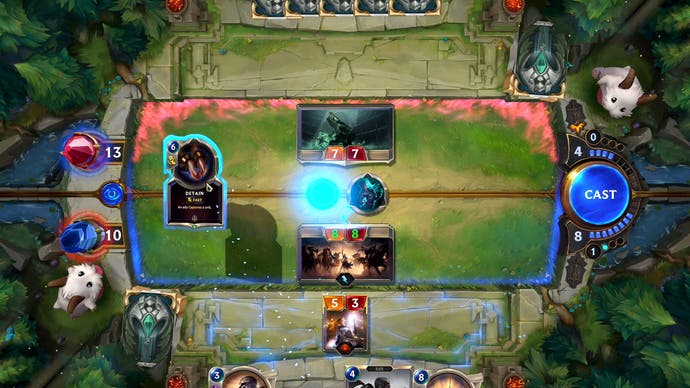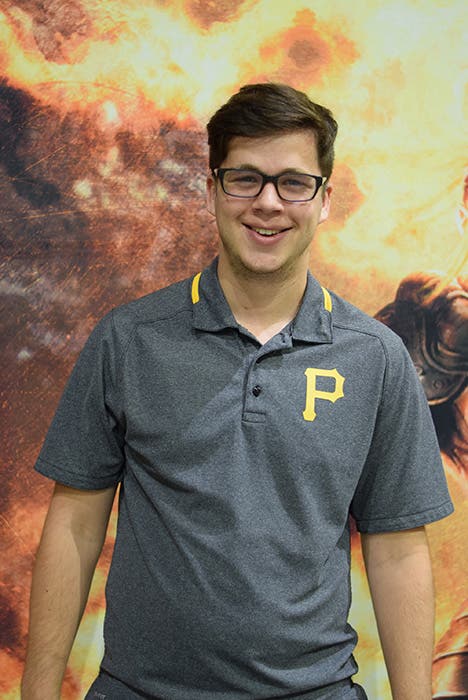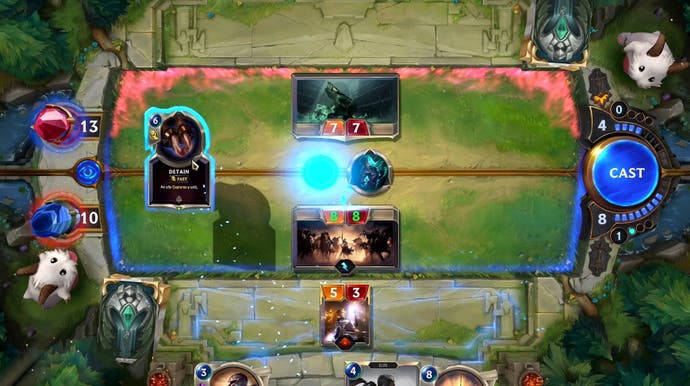Riot says ditching loot boxes will help Legends of Runeterra stand out from the CCG crowd
An interview with former Magic the Gathering pro and current Rioter Steve Rubin.
It's been a big week for Riot Games - and one that finally means that "s" makes sense. Celebrating its 10th anniversary on Wednesday, Riot announced a slew of completely new games, and projects ranging from an animated series to a full port of League of Legends onto mobile.
One of the most interesting things amongst all that celebratory noise was the announcement of Legends of Runeterra, a collectible card game, or CCG, using League of Legends characters and lore. It's what Hearthstone is to World of Warcraft, essentially, or more pertinently what Artifact is (or perhaps was) to rival MOBA Dota 2.
It's releasing at an unusual time. Hearthstone's audience has, by most accounts, gradually shrunk - current issues with Blizzard and China notwithstanding - and Artifact is perhaps the most high-profile flop in recent memory, with the huge reputation of Dota, resources of Valve, and experience of Magic the Gathering legend Richard Garfield not enough to keep it ticking along in any meaningful way. There's also, intriguingly, a complete lack of booster packs, loot boxes, or any kind of random chance microtransaction in the Legends of Runeterra - a major change from the genre's norm.
Lastly, of course, it's worth noting the situation at Riot over the past year. Several lengthy reports have detailed a severely harmful company culture, with problems ranging from harassment to institutional sexism resulting in a lawsuit, tabled by Riot employees, that was settled by the company earlier this year. We spoke to Steve Rubin, a former professional Magic the Gathering player who's now a balancing lead on Legends of Runeterra for Riot, about the origins of the game, why they ditched loot boxes, and his personal experience of what has and hasn't changed at Riot over the past year.

So what's the origin story for Legends of Runeterra - when did someone at Riot sit down and say: okay, let's make a card game?
Rubin: So there's a lot of people at Riot that come from a lot of different gaming backgrounds, and so a lot of them, specifically Jeff Jew (executive producer) and Andrew Yip (design director), are really into Magic the Gathering and really have an inspiration in the CCG genre. And at Riot we really liked the idea of building a game for core gamers who really want to go deep into a genre, and for card games we really felt there was - there are still the offerings that exist - but that could be improved upon. And I think the basis of Legends of Runeterra was just the idea of like, "Hey, we're card game players, for 20-plus years, we kind of know what the good and the bad is," and then some ideations came from that - and there have been a lot of different versions of Legends of Runeterra - and we finally came to what we have now.
So when did you personally come on board, did Riot come and pluck you out, given your history as a professional Magic the Gathering player?
SR: So actually, this is a pretty interesting story, because I was part of a team of four professional Magic players that Riot called in about three years ago, to work on a contract to test out Legends of Runeterra. But what's interesting about that is I'm actually the first non-Rioter to play a Riot R-and-D game, which was - you know, we're very secret about that kind of stuff - it's awesome now we can talk about it candidly, and I can say "Legends of Runeterra" and I'm not living in stealth mode all the time. So then after the contract was over, about a year later Riot approached me to be like "Oh, do you want to be a playtester full time?" and then I ended up as a playtester and then I transferred into design, and that's kind of how I ended up on the team now.
So what makes Legends of Runeterra stand out over say Hearthstone, or Magic the Gathering, or Artifact or something like that? What sets it apart?
SR: I think the biggest thing is definitely accessibility. We really - at Riot and obviously on the Legends of Runeterra team as well - we want to bring games to where players are, and let them play without barriers to entry. And with Legends of Runeterra we have no random booster packs, and how it works is you actually have this thing called the Vault, which is this system where every week you play, and at the end of the week you get a chest that scales based on how much you played that week, full of card content. Because interestingly enough we tried out no-pack models, but players when we tested them in labs were like "Hey, where are the packs?" like people want to open stuff. So we kind of took the good part about pack opening, which is like, you want to get that "spice," right? And we took out the like, "you have to pay for randomness."
And we have a few other features as well, like for instance we have the region road, which is essentially, you get to pick which region you can sort of progress towards. So we have some built in progression models that let you build out your collection - and then of course if you want to buy cards with Legends of Runterra you can do so directly. You can buy a champion wildcard, which directly gets you any champion. So basically the point is there are ways for both free-to-play and paid players to just get any card in the game. So that's actually a surprisingly big differentiator in the CCG market.

Was there any sense you might be coming a bit late to the party with this type of card game genre, in general?
SR: There definitely was a moment in development when we were seeing Artifact coming out and we were kind of thinking "Oh, do we rush it out, or do we not?" and we just really want our games to be perfect. We want to provide for our players as well as we can, so I would say we didn't really feel that much pressure to release at a certain time.
But going back to that idea of of this "full" market, actually we're thinking about bringing Legends of Runterra and card games to new players. So essentially since Riot's all about going where our players are, that's one of the reasons we're not really worried about necessarily saturating the CCG market, but instead captivating CCG players who are interested in our in-depth gameplay, and also serving players who play League, or who have never played card games in the past, due to problems with expensive decks and stuff like that. And another thing we're doing is we're launching with mobile. We'll be on both PC and iOS [and Android] when we launch in 2020, and our thinking there is: "Hey, we're not just attacking this one bubble of the CCG market where there's all these other games, we're actually going all over the place, we want to take CCGs and make them for everyone."
The other thing that's going on with Hearthstone of course is happening right now, with regards to Blizzard and China, is sort of good timing for you - are you looking to capitalise on that or push to take advantage of it?
SR: We're really not pushing any narrative in terms of what's going on with Hearthstone. Right now we're really focusing on Legends of Runeterra and the awesome stuff that's going on with Riot. Like really, the 10 year anniversary is all about our players, and that really doesn't touch any other game companies or what's going on right now, I would say.
You mentioned you don't have any blind packs or loot boxes. What was the thought process behind that?
SR: Yeah so, the idea behind it is really that we just have been card gamers for a long time, and a lot of us have really struggled with those models where, oh, the new expansion comes out in my favourite card game and I just have to click through opening 50 packs, and I have to open my wallet, and it's just a really bad experience. And you know sometimes it ends up feeling good for players - it's definitely not all negative. But we thought that we could take some of the good parts - which is kind of why we had that idea with the Vault, where you get to open cool stuff - and take out that potentially... the model that can be sort of not that player-focused, where the player's supposed to buy a lot of random content. We think that if you want to be able to play it competitively, at Riot we think there should be an even playing field for any game that we make, and especially as we're going mobile, we really want to push that Legends of Runeterra is not a pay-to-win game, and that you will have systems to protect free-to-play players.
Was there any element there of you anticipating potential regulation?
SR: You mean like with loot boxes and all that stuff?
Yeah, were you trying to get ahead of that with a system where you could monetise a CCG without loot boxes?
SR: It's actually not why at all. The system's entirely player focused. We really think about like okay, as card players, what to do we want? We test stuff with players - like for instance we tested and modelled what we called Alliances, where you could sort of purchase an entire region and then just have it. But we really missed out on players feeling like they actually progressed during games - sorry that I'm going a bit off topic - but basically the idea is that we did this for players and not for any other reason.
Is there an ethical element to it, too?
SR: Yeah, I think that ethics is an interesting topic - like I said booster packs are appealing to a lot of players, and actually depending on the region, because we're planning on serving a lot of regions, it can be more or less relevant to players. Whether or not players actually want randomised content or not - it's a lot more normal in a place like Japan than it might be in a place like North America. But the ethics of it really always just comes down to we're gonna do what we think is best for our players.
Is the system going to be the same across all regions - like you say places like Japan, or China, people often actually enjoy those mechanics?
SR: It's gonna be the same. We have some very, very slight differentiators but they're not gameplay related, or anything that's going to impact you - if you played here and immediately flew to China it'd be the same game. But localised!
The last thing I wanted to talk about is the culture at Riot. On a personal level, how has that changed for you over the past year or so, since things initially came to light in the public?
SR: So I can talk on a personal level quickly - I'm here to talk about Legends of Runeterra - but on a personal level I've definitely been, you know... there's been a lot of listening going on at Riot. So for instance one of the big things that we did, to improve our DnI [diversity and inclusion], was we kind of rebranded what being a Rioter was. So there were a lot of conversations where we had, like, roundtables with all Rioters, and we kind of re-defined our previous Riot manifesto, which is kind of like what Riot is all about. And that was actually really awesome as somebody who, you know, wouldn't normally figure that I would get a say and be like, "Oh, what does Riot mean to me, and what does being a gamer mean to me?" That way we can kind of agree on what a more inclusive environment is. So just for me on a personal level sort of participating in those discussions was really awesome.
There's a lot [of other things] too right, like we all had specific training, we all have harassment training as well. One of the things on the Legends of Runeterra team, for every interview panel we do, we have at least one woman on that panel. Which seems like it should be something that's a no-brainer that we should have been doing, but now we're just making sure that we're following up and doing that kind of stuff.
And I don't think that we're ever going to be done. It's kind of going to always be a challenge for us moving forward I think.


